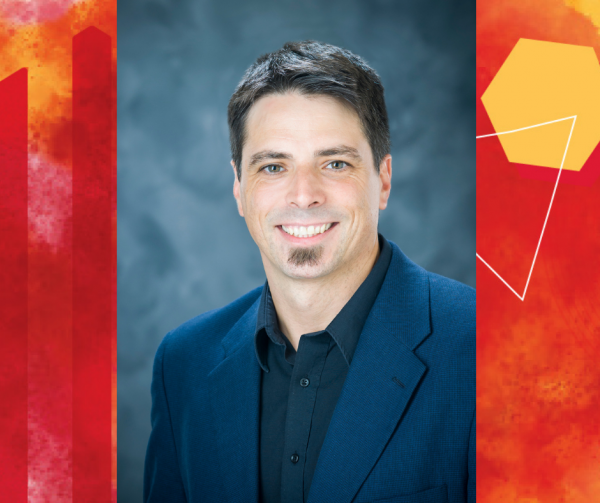 Iowa is more than 5,600 miles from Diego Thompson’s native Uruguay, but through the relationships he developed while earning advanced degrees at Iowa State University, he considers Ames his home away from home.
Iowa is more than 5,600 miles from Diego Thompson’s native Uruguay, but through the relationships he developed while earning advanced degrees at Iowa State University, he considers Ames his home away from home.
“I really loved my experience at Iowa State, which is a place that I call home. In fact, I visit it very often because I have very good friends and colleagues and also family there,” said Thompson, who received a master’s degree in 2010 and a doctorate in 2014, both in sociology and sustainable agriculture.
He even fondly remembers the many hours he and other graduate students spent in East Hall’s fourth floor, despite the warm temperatures and bat encounters.
“We lived all different types of experiences in that place,” Thompson said. “I think we created a good sense of family on the fourth floor. We had graduate students from different countries and also from the U.S., of course. We made friends and, at the same time, we were able to have very rich discussions about work. It was a great opportunity to learn from each other, not only about the work that we were doing but also the background we were bringing from all different places. That’s quite unique to meet all these people from all over the world with different experiences and different views in a very tiny place on the fourth floor.”
Major mentors
Two individuals who profoundly impacted Thompson while he attended Iowa State were his major professor Cornelia Flora, Distinguished Professor emeritus of sociology, and Jan Flora, professor emeritus of sociology. Thompson met Cornelia Flora when she visited Uruguay while he was an undergraduate student studying social and cultural anthropology at the University of the Republic of Uruguay. He was familiar with Flora’s research in sociology and sustainable agriculture, which ultimately led him to Iowa State.
“I think all of these different factors and combination of different types of work I was seeing at Iowa State, particularly in the department of sociology and the sustainable ag program, really motivated me to look at social aspects of sustainable ag and also rural development,” Thompson said.
Thompson credits the Floras and other sociology faculty members for mentoring him throughout his time on campus.
“All these faculty members had a great impact on my work, but of course the work done by the Floras had a significant impact on the type of academic work that I do today. I learned a great deal from them and I’m very grateful for that,” Thompson said.
A similar path
Today, Thompson is an assistant professor of sociology at Mississippi State University, where he teaches everything from introductory sociology courses for undergraduates to specialized seminars for graduate students.
Like the Floras from Iowa State, Thompson’s research focuses on how communities adapt to environmental problems in the U.S. and in Latin America, primarily Uruguay. He also has examined the different problems Latin American immigrants experience when working in the food industry, particularly in Iowa’s meatpacking plants, on Vermont dairy farms and, more recently, in Mississippi’s chicken processing plants. He analyzes the different realities these immigrants experience, and he also looks at the community responses immigrants develop as a result of the challenges they face. Offering solutions for disadvantaged groups is what drives his research.
“All my work has an important component of social justice, particularly focusing on disadvantaged communities and groups,” Thompson said. “That’s what motivates me, to do something that could be helpful for these groups and communities by creating new knowledge that could be potentially used either by these communities or by policymakers.”
Award-winning work
Thompson’s work is deemed excellent by his peers, and he recently received the Community Development Society’s International Community Development Award. This award recognizes outstanding contributions to community development in an international setting, which includes working with communities in countries outside the United States; working with immigrants and refugees within the U.S.; and research, teaching or practice that contributes to international community development outcomes.
“It was a huge honor for me to receive that award. I’m very grateful for that,” Thompson said. “It is wonderful when your work and the effort that you do to achieve excellency and produce high-quality products and outcomes is recognized.”
But of the numerous honors and accolades that Thompson has earned so far in his early academic career, the most meaningful award came from the student ambassadors in his college at Mississippi State in fall 2020, when teaching and learning were complicated by the COVID-19 pandemic.
“It was a surprise for me, and it came from my students from different classes. That was very meaningful because we were experiencing a very difficult time teaching online and also in person,” Thompson said. “The students also were having a difficult time during the pandemic. The fact that they organized and promoted this award, nominated me and selected me was very meaningful for me, especially under those difficult circumstances.”
Advice for students
Thompson’s advice for current Iowa State students studying rural sociology is to take advantage of the resources available to them.
“Iowa State is a perfect place to study rural sociology,” he said. “Take advantage of all the resources and things that are going on, not only within the university, but also outside of the university through the work that is being done by faculty members that are working with other communities.”
Thompson also warns that the college experience is fleeting. He encourages today’s students to enjoy their time at Iowa State, just as he did while a graduate student in East Hall’s fourth floor.
“It’s a great university,” he said. “Enjoy the college experience.”
